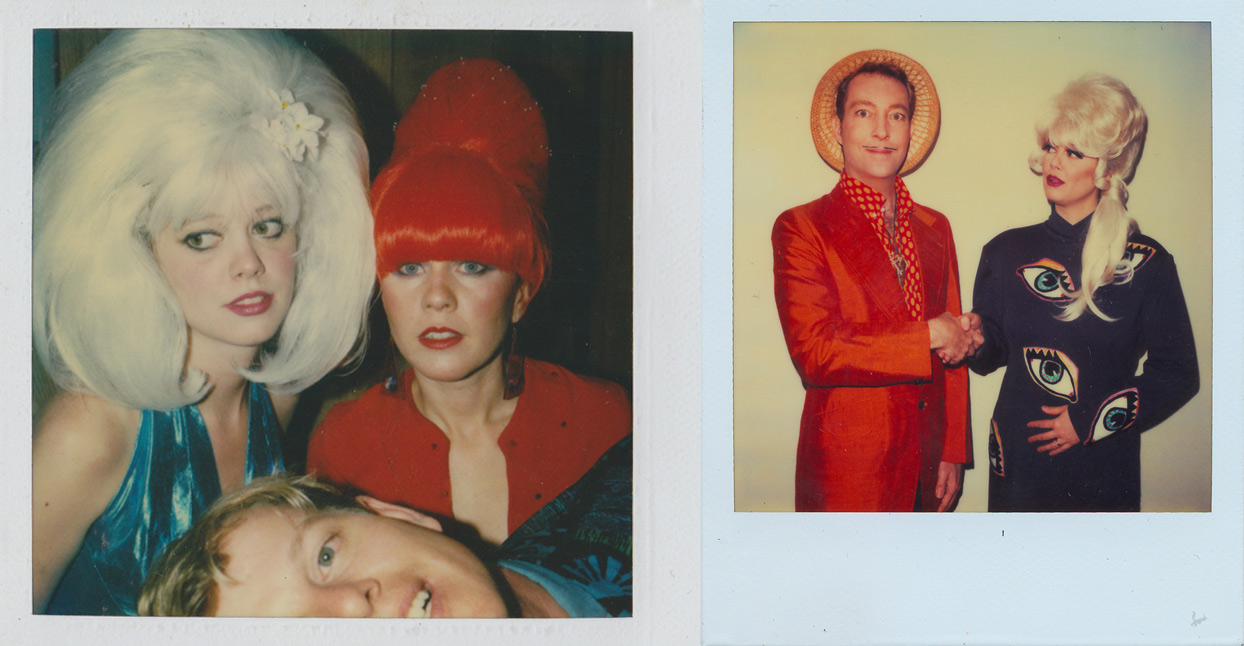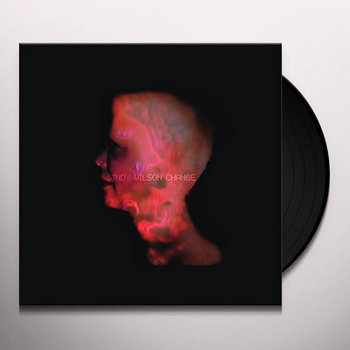
As two-thirds of the boisterous vocal threesome that fronts the B-52s, Cindy Wilson and Fred Schneider are well-known for their expressive singing styles. Along with fellow vocalist Kate Pierson, multi-instrumentalist Keith Strickland, and late guitarist Ricky Wilson (who is long overdue for recognition as a 20th-century guitar visionary), the two singers helped craft one of the most distinctive sounds to emerge from the new wave era. Now, with the band still in full throttle celebrating its 40th anniversary (which passed on Valentine’s Day of this year), Wilson and Schneider also find themselves in the process of unveiling newly completed full-lengths on the side.
Fred Schneider & The Superions’ The Vertical Mind features Schneider’s hyper-manic persona front and center in a kind of pleasantly dystopian tiki/lounge/disco synthscape supplied by the core duo of Noah Brodie and Dan Marshall (The Superions). Arriving seven years after the group’s album of Christmas-themed originals, Destination…Christmas!, Vertical Mind sees Schneider keeping tongue firmly in cheek even as he gets edgier than we’re used to seeing him in the B-52s, addressing subjects like airport strip searches, lust, and…meatballs.
Wilson’s full-length debut Change, out in November, showcases her sensitive side against a rich, varied backdrop of futurist, electro-shoegaze psychedelia courtesy of guitarist Ryan Monahan, drummer Lemuel Hayes, and producer Suny Lyons. Both albums are the fruits of collaborations that have been simmering slowly for the better part of the last decade. Wilson begins a short tour of U.S. cities in early September.




Vinyl LP, Compact Disc (CD)


We spoke with Wilson and Schneider from their respective homes in Athens, GA and Long Island via conference call. No surprise, they finished each other’s sentences a lot and broke out into laughter with almost every response.
You’re both in creative partnerships with groups of musicians who were already working together when you joined them. Could you talk about how you exchange ideas with them?
Fred Schneider: For me, Dan and Noah lived in Orlando at the time, and they asked me to put some words to some music they had written, which was very tropical—because we all like lounge music—and I just came up with something off the top of my head. Then, every time the band would go down to Florida, I would jam with them—sometimes with [pre-conceived] ideas, and sometimes spur of the moment. We got a rhythm going where we did our first EP, then the Christmas album, and now we have this Vertical Mind album. They do everything on ProTools, and we call it ‘three-dollar production,’ because there’s no budget. [Wilson and Schneider both laugh.] We’ve had Ursula 1000 and [Brian] Hardgroove from Public Enemy produce some of the new songs. It’s been fun.
Cindy Wilson: Suny Lyons has his own way of mixing that’s very modern. It’s been like a school for me to sit back and let Suny apply his imagination and his ears to the music. He came up with the sound of the record, this combination of psychedelic and electronic with French pop. He was very good about listening to Ryan and me and what we wanted in the mix too. It’s been amazing to watch the mixture of all these styles together, but [produce] a consistent album.




Compact Disc (CD), Vinyl LP


Cindy, talking to your husband [and one-time Ricky Wilson guitar tech] Keith Bennett to prepare for this interview, I got the impression that in the early days of the B-52s, the musical connection between Keith Strickland and Ricky was kind of the engine that drove the band—
Schneider: Well, I wouldn’t say that totally, because we all had ideas—
Wilson: What I think he meant was in the music. The first step was Ricky and Keith.
Schneider: Well, yeah, they came up with the music.
Wilson: But it was definitely all of us, in different stages.
Schneider: The music wasn’t always fully formed until after. We would jam on the lyrics, they would take those and put something loose together [as a structure around the lyrics], and then we would go back and re-arrange it. Things were never set in stone until everyone listened to everything.

On your new records, you both sound very comfortable. Your collaborators have created this background of sound that fits you both. How much do these newer partnerships hearken back to the way you used to work with Ricky and Keith?
Schneider: With me, none. Because I basically write all the lyrics and get Noah and Dan’s ideas for the music. Or they have ideas and I add onto them.
Wilson: For me, it’s very, very close. In fact, one of the things I love working with this new bunch of people is that it does feel like I’m working with Ricky and Keith as far as collaboration and, again, learning. It’s an effort where I get to grow, just like in the early days of the B-52s, when it felt like it was a growing spurt.
Way back, you described the B-52s as dada-ist, and that’s also the word you use to describe the Superions as well. How do you see what you’re doing as dada? Because there’s also that book of poems you did early on that inspired the first album…
Schneider: That’s where it’s from. My last year of college, I took a creative writing course and then I realized—because I was in forestry for the first two years and I switched to journalism—that I’d have to go to college for another two years. I did fairly well, but I just didn’t want to do two more years of college [laughs], even though I no career plans. So a friend of mine says, ‘I’m going to do this book of poetry for my final project’ and I go, ‘Boinggg, me too!’ [Wilson laughs.] The poems I wrote were very surreal and just, uh… odd. I had to read them in front of the class. This is Georgia in 1972, I think. Everybody but one person just sat there looking at me like, ‘What the hell?’ [Wilson laughs.] And the teacher even said, ‘I don’t understand any of this, but I know you’re serious.’ And I was. After a while, I really got into it. Some of the songs [off the B-52s’ 1979 self-titled debut album] came from lines from the book. I would jam with Keith in his basement on the spur of the moment. He would blow wind on a guitar, and I would sort of recite and sing. It’s surreal imagery. Things would pop in my head and I’d sing them and if I liked it, it would stay. Same with the band, all of us. We’d just start spontaneous and then start writing things down.
That poetry project was titled Bleb, poems based on overheard conversations.
Schneider: Yes. And then I expanded it to a book with Kenny Scharf’s drawings [released in 1987 as Fred Schneider and Other Unrelated Works; Scharf drew the cover art for the B-52s’ 1986 album Bouncing off the Satellites—ed.].


Compact Disc (CD), Vinyl LP


So those poems were an inspiration to all five members in writing the first two records, correct?
Schneider: I think everyone read the book and liked it. I don’t know if it inspired them.
Wilson: I think we inspired each other.
Schneider: Yeah. We all had a lot of similar tastes. We liked a lot of the same music, movies. We had a similar sensibility about a whole lot of things.
And you all liked going to thrift stores in the middle of rehearsal, right?
Schneider: Well, yeah. The thing is, we had no money, so it was like 50 cents for pants, 25 cents for a shirt, and a dollar for a jacket, so—
Wilson: Also, we wanted visuals. We liked to shock people.
How much was the seersucker suit that Fred’s wearing on the cover of the first album?
Schneider: That was actually part of a Halloween costume that originally consisted of an [undershirt] and a broken cigarette and a penciled-in moustache. [I didn’t look that way because of a] hangover. [Everyone laughs.]

The B-52s rehearsed religiously in your early days.
Wilson: Yeah, we definitely believed in rehearsal. They were unconventional songs, and an unconventional way to write. So we had to rehearse to learn when to come in and nail down the vocal melodies. They’re actually [challenging] little songs.
Schneider: The structures aren’t A-B-A-B-C-A-B-A-B and out. Sometimes they just take a totally different turn and just go… out [there].
So it sounds like just being in each other’s company was the motivation to spend hours working on the music.
Schneider: Well, none of us had really [good jobs]. I mean, I liked my job. I was the meal delivery coordinator for the Council on Aging for Clarke County—which was the most money I’d ever made before—but Kate didn’t really like her job at the local paper. Cindy had a fun job, but I don’t think it was well-paying. [Laughs]
Wilson: Well, no. For Athens, it was fine. I was a waitress at the luncheonette counter at Kress’s, which was like the center of the universe for Athens.
Schneider: It was. Peachy Burger Melts and pop a balloon for a free sundae.
Wilson: People would just come through that you knew. It was a parade of different characters. It was a really interesting and amazing experience. And at the end of the day, I would have an acre full of change, which was easy to survive on.
Schneider: Yeah, you could really live cheap. Rent was like 60 dollars.
Wilson: At the Taco Stand, you could eat for two dollars, and there was quarter beer night—
Schneider: At Allen’s [mentioned on the 1989 single “Deadbeat Club”—ed.].
Wilson: But it was really thrilling for me. I really enjoyed the band. I loved hangin’ out with everybody. It was a real growing experience for me. I was like 20 years old when we started—a baby, really. So it was all very exciting. I loved the revelations, everything that I was learning from everybody. And we were making people have fun and dance. It was a trip. And also, I met my husband at that first party we played [on Valentine’s Day, 1977—ed.]. He passed a joint to me or something. [Laughs]


His version was a lot more wholesome.
Wilson: Well, the point being that it was amazing. On that one night that the B-52s [played for the first time], I also met my husband. So for me, the planets were in a crazy alignment. Those have been the most important relationships in my life.
Fred, what was your first impression of Cindy?
Wilson: Hey, watch out now!
Schneider: Oh, [she was] fabulous! [Wilson laughs.] I kept asking for Ricky for years, ‘When am I gonna meet your sister?!’ And there’d be no response. [Laughs] Not that he was ashamed or anything like that, but it was just like [feigns eye-rolling tone], ‘Oh, my little sister,’ you know. But we hit it off right away.
How much did you have growing pains getting along? Because there were times where you would all live together to write, like after your round of touring on the first album was over.
Schneider: That wasn’t a good idea, to be honest.
Wilson: The time we moved to Mahopac, New York, there was just too much togetherness. We did it as an investment with the Warner Bros. money, but it was just too much.
Schneider: The old fart who lived next to us was suing us all the time—
Wilson: Because it was women and men living together and we weren’t—
Schneider: Yeah, god forbid individuals who weren’t married or a family lived together. And plus, it was like the middle of nowhere. You really had to drive to get anywhere. And it was known to be a not-very-friendly town.
Wilson: I know. But we wrote some really good music there.
Scheider: Yeah, we did.
Wilson: We survived that. To me, that was a lesson to learn, a life lesson. Keith and Ricky and I bought a place in New York [City] later. And Fred and Kate both found apartments in New York as well, so it became a much healthier situation.
Schneider: Plus, we weren’t very happy with management. That was a depressing thing about working. We were really ready to leave the management we had at the time as soon as we could. But it took six years.
Wilson: Yeah. [Laughs]
Schneider: That makes a difference. But living together was like The Shining sometimes.
Wilson: [Laughs] Well, it snowed [a lot] and we were kind of stuck in the house. There was only one vehicle.
Schneider: Yeah, we had this one van. It was isolated.
Wilson: My husband—boyfriend at the time—was living with us in Mahopac. It felt like, all of a sudden we’d left Athens and our friends, and we were plopped in a new space and it was all B-52s, all the time. Also, my husband started going out looking for jobs related to his field, which was in advertising.
Schneider: He had to [commute] to New York.
Wilson: I had to take him to the train station. It was 30 minutes to the train and an hour into New York or something like that, which was crazy. But we did it.

In 1987, the B-52s appeared in the ‘Summer of Love’ public service TV spot for Art Against AIDS. [Ricky Wilson died of complications related to AIDS in 1985—ed.] Since then, the band has weighed in on various social causes. As the B-52s do these 40th anniversary shows and you kind of take the temperature of the country, how much do you feel like you want to address what’s going on socially and politically in your solo work? It feels like there are flashes of it, but how are you responding as artists?
Schneider: I think what we do best is, do whatever music we feel passionate about, and we talk about the political stuff in interviews and do benefits and things like that. We don’t want to write songs where we hit somebody over the head with a message. ‘Channel Z’ [from Cosmic Thing] is very direct, but it also just isn’t a downer.
You’ve always balanced social conscience with fun. Years ago, Keith Strickland said that the B-52s are a ‘party band’ first and foremost.
Schneider: Yeah, we want to entertain people, but a lot of our songs have hidden messages. Like, we knew about the Radium Girls, who would [moisten] their paintbrushes [with] their tongues and then dip the brushes in radium paint for radium dials [in watch-making plants]. And after a couple of years, their jaws and teeth were falling off and they were dying.
Wilson: There’s still a part of Athens [an abandoned watch factory—ed.] that’s fenced-off [after being declared a radioactive contamination site by the EPA—ed.].
Schneider: That was in ‘Private Idaho’ [on 1980’s Wild Planet].
Cindy, on Change, you’re embracing an outlook that’s more… universal, maybe? There’s a sense of all of us growing as people together.
Schneider: It’s very positive and ethereal.
Wilson: We hope so. It’s kind of a searching record and [it delves into] looking inward. It’s kind of playful at times, but it’s definitely [directed] inward.
I have to ask: There’s been a lot of speculation behind what the meaning is behind the famous ‘Love Shack’ line ‘tin roof rusted.’ [Wilson laughs.] It’s well-documented that the music just stopped and you just ad-libbed. But there’s an interview from a Georgia radio station where you and the host were joking back and forth hinting that it’s a reference to a woman’s time of the month. At least that’s the impression I got. [Wilson laughs again.] Can you set the record straight?
Wilson: I love all these stories that have revolved around ‘tin roof rusted,’ but actually it’s none of those.
Schneider: Keep the mystery going!
Wilson: [Laughs] So let’s just keep the mystery going.
Schneider: It isn’t anything like that. Let’s just say that when we were jamming I couldn’t hear what Cindy was saying, and she just heard me go, ‘You’re what?!’ And she was going on about a tin roof or something. [Wilson laughs.] You know, a love shack [would have] a tin roof.
Wilson: When we listened back to the tape, we thought it was a great way to end the song.
Mysteries pop up around all sorts of things you’d never expect!
Wilson: Exactly.
Schneider: Well, we love what people think ‘cause it’s like so off the mark. It’s like, ‘Where’d you get that?!’
Wilson: I know! It’s very creative. And the audience becomes a participant in the creation of the song, in a way. We’ve hesitated to ever explain any of our songs, because we love their interpretations.
Schneider: I mean, who ever came up with ‘tin roof rusted’ being about being pregnant? [Wilson laughs.] When I first heard that, I was like ‘What?!’
Wilson: There’s probably a lot of wild interpretations to some of our songs.
Schneider: Well yeah, [lyrics] like ‘I’ll meet by the fur pyramid.’
Wilson: Oh, Fred! What about the backwards part that says ‘Your canary is dead’?
Schneider: ‘I burned my parakeet in the back yard.’
Wilson: [Laughs] What song is that!
Schneider: That’s on ‘Detour Through Your Mind’ [from Bouncing Off the Satellites].
Wilson: That’s right. There’s a backwards voice of Fred’s on that, which has probably prompted a lot of speculation, you know.
Schneider: You have to ruin your record to hear it.
—Saby Reyes-Kulkarni








